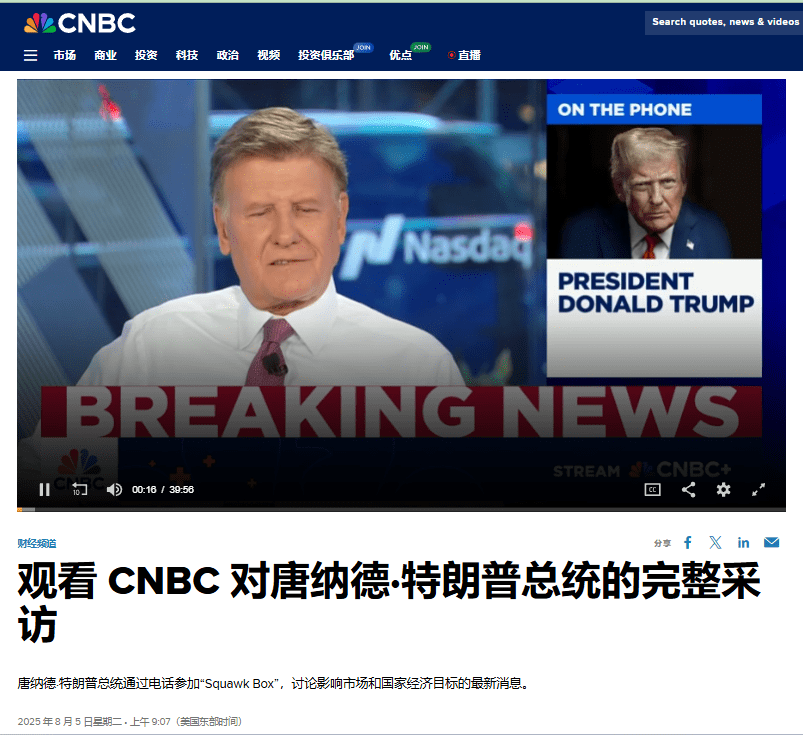On August 5, local time, in an interview with CNBC (Squawk Box), U.S. President Trump continued his consistent straightforward style, discussing economic data controversies and future political plans, showcasing his policy priorities and political considerations for a second term.

Economic policy and employment data controversy
He first pointed the finger at the U.S. Bureau of Labor Statistics (BLS), accusing it of political manipulation of household survey data, particularly mentioning the data revision issues during the 2024 election period, believing that the initially optimistic employment data was artificially adjusted to unfavorable results.
To this end, after the employment report released in July this year, he fired former BLS director Erika McEntarfer, calling her a bias towards "Biden's political appointee," a move that once again highlighted his hardline stance on 'depoliticizing' the administrative agency.
Hardline stance on trade policy
When discussing specific economic policies, Trump revealed a series of upcoming trade measures, including new tariff policies targeting semiconductors and chips, as well as a notable drug tariff plan. The initial "small initial tariffs" would gradually rise to 250%, aimed at forcing pharmaceutical companies to move their production lines back to the United States.
Regarding India, he announced that he would significantly raise the current 25% tariff rate within 24 hours, directly citing the country’s profits from reselling Russian oil. Although he acknowledged that trade agreements with the EU and Japan brought considerable revenue, he did not rule out the possibility of imposing a 35% retaliatory tariff on the EU. This approach, which showcases results while maintaining deterrence, is a typical example of his "art of the deal."
Federal Reserve restructuring and economic team layout
Regarding monetary policy, Trump confirmed he is considering four candidates for Federal Reserve chair, among which National Economic Council Director Kevin Hassett and former Federal Reserve Governor Kevin Warsh are seen as strong contenders, while current Treasury Secretary Scott Bessent has been determined to be out due to his desire to remain at the Treasury. The other two candidates remain unnamed.
He again criticized the current chair, Powell, for slow action, blaming last year's economic fluctuations on his "highly politicized" delayed interest rate cuts, indicating that he might further strengthen his influence over the Federal Reserve.
Election controversies and banking industry disputes
This focus on economic institutions naturally shifted to discussions of political issues. When the host mentioned election issues, Trump reiterated claims of "fraud" in the 2020 election, which was immediately refuted by the host citing the Justice Department's investigation results, but he quickly pivoted to showcase the campaign achievements of 2024, especially emphasizing the historical highest vote record set in Texas. This shift from defense to offense demonstrated his adept political strategy.
In the middle of the interview, Trump unexpectedly disclosed private disputes with JPMorgan and Bank of America, accusing the two major financial institutions of refusing to provide him services due to political positions and even demanding he transfer hundreds of millions of dollars in funds in the short term. This revelation seemed sudden but actually echoed his push for "anti-financial monopoly" policies.
Industrial policy extension and future political trends
When discussing industrial policy, he exaggerated TSMC's investment scale in Arizona, turning the actual announced $165 billion into $300 billion. This exaggerated expression reflects his urgent expectation for the return of the semiconductor industry chain.
When the host pressed him about his 2028 campaign plans, Trump initially avoided by saying "maybe not," but then changed his statement to "I hope to run," emphasizing public support for his tariff policy. This ambiguous statement preserved political flexibility while cleverly tying policy effectiveness to his personal political future.
As the interview neared its end, he released an optimistic signal of possibly reaching a trade agreement with China, suggesting that his trade war strategy might enter a new phase.
Throughout the interview, Trump interspersed specific policy details and election data among his hardline remarks questioning official data and threatening tariff escalation, attracting attention through controversy while also reinforcing policy legitimacy with the results of industrial return, a mixed tactic that consolidated his basic support while leaving room for subsequent policy adjustments.
Conclusion:
In this information-packed 40 minutes, Trump once again proved that he remains the political operator best at "exchanging controversy for attention." Whether it’s a real and tangible tariff policy or personal grudge revelations, he hit the public opinion hot spots accurately.
While other politicians were still weighing their words, this former businessman president already understood a truth: in the era of traffic, those who can continuously create and dominate public opinion topics hold the power to define reality.
Ultimately, whether it’s tariff threats or election controversies, every "thunderclap" is not about debating the truth, but about competing for narrative dominance.

